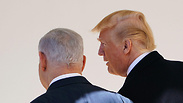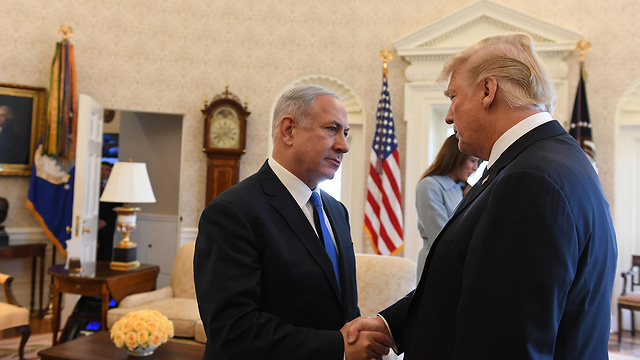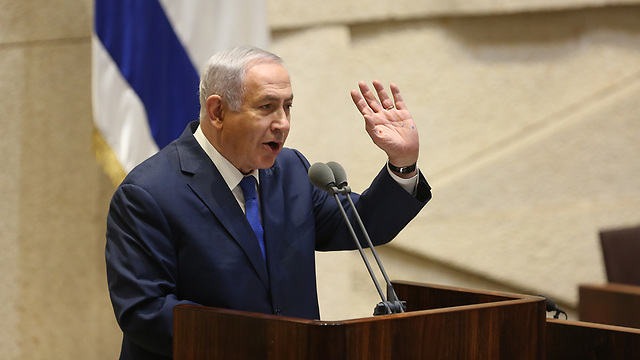

Netanyahu's ulterior motive
Op-ed: Even if the prime minister turns a future election campaign into a modern ‘Dreyfus trial,’ waging an impulsive battle against the state’s institutions and the media—like Trump— it will have no effect on the results of the legal proceeding against him; 30 or 40 Knesset seats, a third of the public, can’t stop a legal process.
Since Trump’s surprise election, against all polls, Prime Minister Benjamin Netanyahu has developed a sense of a shared fate with the big brother from Washington, on his part at least. In the past year, this feeling has taken shape.
The international and Israeli media often compare Netanyahu to Trump. They both evoke admiration and hatred, they are both experts in motivating the masses, they are both dealing with investigations and accusations, and they are both pointing fingers at the state’s institutions, despite being the ones in charge of them.

Netanyahu may like being compared to Trump, but I see it as an insult to him. The Israeli prime minister is an intellectual and an experienced leader, while the American president—who reached the White House from a reality show—is characterized by vulgar language and poor personal morals. But fate and interests have called the shots.
Trump is considered a morally corrupt president by most Democrats because of his women-related affairs and blatant language, but he has actually brought some impressive achievements, at least in America’s foreign relations and at least in Israel’s eyes. He may be morally corrupt, but the decision to move the US embassy to Jerusalem forced the Muslim countries to realize that there are restrictions and forced the Palestinians to step out of the comfort zone of blaming Israel for their own impotence.
And if that were not enough, after three presidents with a failed attitude towards North Korea, it was actually Trump and his ridiculous threats on Twitter that moved the tyrant from Pyongyang in a positive direction. The madness was much more efficient than former President Barack Obama’s destructive discretion and soft diplomacy.
And the same applies to our Netanyahu: While there may be problems with a few cigars, as his associates say, he is nevertheless an excellent prime minister with economic, security and diplomatic achievements.
If that’s the case, according to comparative logic, if the American public, which is so obsessed with political correctness, chose a blatant, rude and corrupt president, but one who is also achievement-oriented, the Israeli public can also tolerate blatant speech and a few corruption investigations for the sake of achievements. And is there anything clearer than an election victory?
But this is where the comparison ends and the error begins: Trump may get mired. There are investigations against him that might develop into something serious. Netanyahu, on the other hand, is already mired.

The greatest absurdity in calling elections that are based entirely on Netanyahu's investigations, and are seen as a sort of vote of confidence in him, is that they will have no effect on the results of the legal proceeding against him. Thirty Knesset seats, one-quarter of the public, or even 40 Knesset seats, one-third of the public, won’t stop a legal process.
On the contrary, Netanyahu is solidifying the legal process. The more he undermines the credibility of law enforcement systems, they will be forced—for fear of making a mistake—to cement the evidence and testimonies against him so that no court will have any hesitations.
And anyway, imagine what could happen in Israel one year from now, after elections but also after the attorney general’s decision to indict Netanyahu. Although the law allows a prime minister to remain in office while walking in and out of courts, that’s an unlikely and unreasonable scenario. And if it does happen, the coalition he forms won’t survive public criticism.
If the attorney general decides to close all the cases, it means the police and the State Attorney’s Office have to conduct a thorough self-examination. In any event, despite the clear direction, a mandate from the people—if he receives one—won’t change anything.
What’s the conclusion? The next elections (regardless of when they take place) could be turned into a modern-day “Dreyfus trial” and into a prime minister’s impulsive battle against the state’s institutions. Like Trump. As Minister Ofir Akunis said, they could be turned—like with Trump—into a battle for Netanyahu and against the media (two “well-known” principles in the Revisionist doctrine and in Zionist history).
Netanyahu may win and gain a lot of Knesset seats, just like he may lose. After all, every election campaign has the mystery of 10 Knesset seats which no one knows where they’ll end up. What can’t be changed is the legal process. Trump is working from afar. From here, it’s more complicated.















